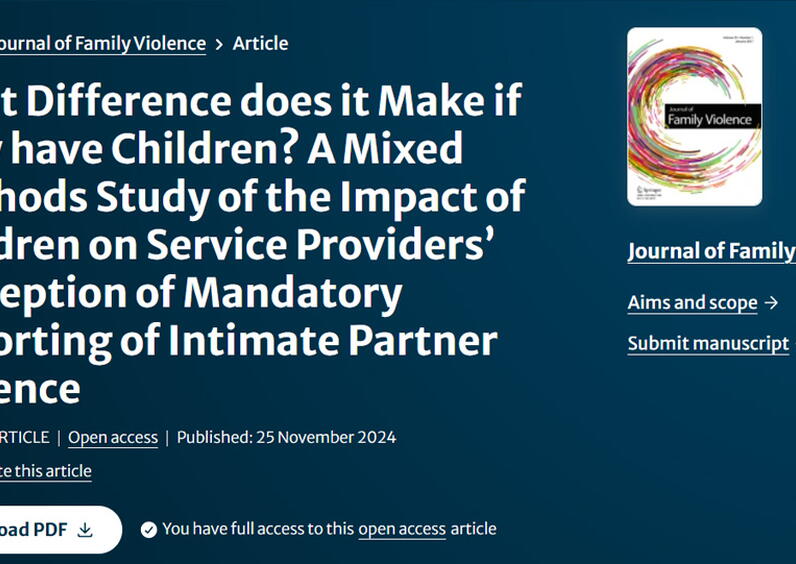Different perceptions and experiences of the duty of confidentiality, the right to provide information, and mandatory reporting may pose significant challenges. MANREPORT-IPV is a cross-professional study examining service providers’ mandatory reporting of intimate partner violence (IPV). IPV is a serious public health problem, even in Norway. Evidence reveals that in a majority of intimate partner homicides, the perpetrator or the victim has been in contact with service providers previous to the homicide. This finding indicates a potential for prevention.
Service providers, including police and health personnel, have a duty of confidentiality. People expect confidentiality and not the forwarding of personal information, unless a consent has been given. However, service providers may have a duty of mandatory reporting when receiving information with potential to prevent serious criminal acts. The threshold is if it appears certain or most likely to the service provider that such an act will be committed. The duty to avert such a serious crime applies regardless of any duty of confidentiality. There are strong feelings and opinions regarding mandatory reporting of IPV. However, the empirical knowledge is scarce. The aim of this study is to investigate what experiences, awareness, and attitudes do professionals and IPV help-seekers have concerning mandatory reporting of IPV. To examine this aim we will do:
- Systematic text studies (court documents, and other legal decisions and reports)
- Qualitative interviews with service providers and help-seekers regarding experiences, awareness and attitudes to mandatory reporting of IPV
- Quantitative questionnaires of service providers and help-seekers’ perception of and experience with mandatory reporting of IPV
Throughout this study, we will examine the prevalence of information about mandatory reporting or the lack thereof in judgments and other juridical sources. We will analyse service providers’ experiences with and attitudes to mandatory reporting, and seek to clarify the content of the law, e.g. the threshold for mandatory reporting. In addition, we will analyse and compare data from doctors, nurses, domestic violence shelter workers, child protective services, psychologists, and the police. Similarly, we will collect and analyse data from IPV perpetrators and victims. Studying these data enables us to analyse horizontal and vertical interactions between and among service providers, and between help-seekers and service providers. The project will contribute to innovation by providing knowledge about facilitators and barriers to mandatory reporting of IPV, thus building a foundation for more evidence-based recommendations for service providers regarding mandatory reporting, and preventing IPV.
A brief overview of Norwegian legislative regulations
Introduction
Client confidentiality is an important principle in professional settings in most countries. Still, several jurisdictions have adopted legislation requiring professionals to disclose client information to the authorities under certain circumstances, such as cases of intimate partner violence (IPV), or high risk of IPV. Disclosure required by law is commonly referred to as mandatory reporting, while disclosure allowed by law is commonly referred to as discretionary reporting.
The Norwegian regulations
In Norway, reporting to the authorities as a means of preventing a wide range of harm is regulated in section 196 of the penal code, applying to all citizens, including (but not restricted to) (health) professionals. Unfortunately, the English translation does not reflect the latest amendments, but these are not substantial regarding mandatory reporting of IPV.
Section 196 refers to 52 other sections, mainly in the penal code, specifying which criminal acts are covered by the duty to report. These include threats to Norway’s autonomy and fundamental national interests, terrorist acts, homicides, sexual assault, domestic violence (sections 282 and 283) and more. The duty to report may be executed by notifying the police or by averting the criminal act or its consequences “by other means”, thereby introducing a discretionary space. Failure to report according to section 196 is a punishable crime, unless reporting would imply exposing the person who reports, his or her next-of-kin or an innocent person, to a charge or indictment or risk to life, health or welfare. Mandatory reporting is not restricted by any professional law of confidentiality, as it applies to all adult citizens. Certain professions will have additional duties, e.g., to report to the child welfare services if they suspect child abuse or neglect.
The duty to avert a criminal offence - the case of severe IPV
The primary aim of section 196 is to avert specified crimes, such as severe IPV. The duty’s main purpose is to prevent current or future crime, or the consequences thereof. Thus, the duty only applies when prevention is in fact possible. In cases of IPV, professionals may in some cases fulfil their duty to prevent severe IPV by ensuring that the patient goes directly to a domestic violence shelter.
Moreover, the duty applies if you have information indicating that it is “certain or most likely” that the crime will be committed. The threshold for eliciting the duty is severe or persistent IPV (sections 282, 283).
Project Manager:
Kjartan Leer Salvesen og Solveig Karin Bø Vatnar
CEO:
Aktuelt
Eit utval medieklipp:
Krimpodden frå VG (31.3.22) tek opp problemstillinga avvergeplikt, risikovurdering og valdshistorikk i innslaget om Kristiansand-drapet. I podcasten fortel professor Solveig Karin Bø Vatnar om arbeidet frå si forsking om partnerdrap og valdshistorikk. Høyr podcasten:
Fleire mediesaker:







